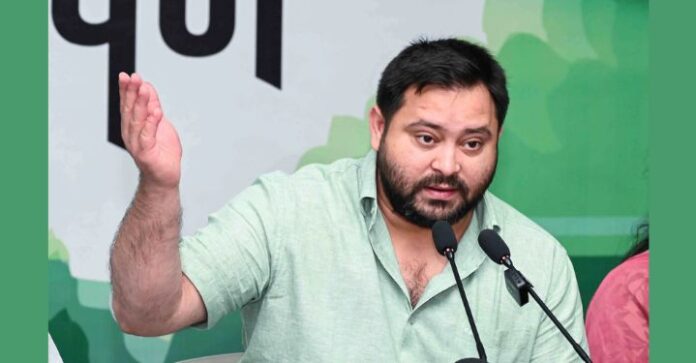In a move that could significantly impact the upcoming Bihar Assembly elections, the Rashtriya Janata Dal (RJD), backed by the broader INDIA bloc, has filed a petition in the Supreme Court challenging the Election Commission of India’s (ECI) decision to conduct a Special Intensive Revision (SIR) of the electoral rolls in Bihar. The petitioners allege that the process, announced just months before the state elections scheduled for October–November 2025, is hasty, exclusionary, and unconstitutional.
Background of the Dispute
On June 25, 2025, the ECI initiated a sweeping review of Bihar’s voter rolls, claiming the need to update outdated records and remove inconsistencies. According to the Commission, the last such revision occurred over two decades ago in 2003, prompting the need for a fresh verification process that would begin immediately and conclude by the end of July, with the updated draft rolls expected by August 1.
The opposition, however, sees this as a politically motivated maneuver. Led by RJD and supported by the Congress, Left parties, and other INDIA bloc members, critics argue the sudden timing and the short deadline for submission of documents pose a severe risk to the voting rights of millions.
Legal Arguments Presented
In their petition, the RJD and co-petitioners, including the civil society group Association for Democratic Reforms (ADR), contend that the revision exercise violates constitutional guarantees under Articles 14 (equality before law), 19 (freedom of expression), and 21 (right to life and liberty). They also cite provisions from the Representation of the People Act, 1950, and the Registration of Electors Rules, 1960, arguing that the current process does not comply with the legal framework governing voter registration.
One of the most contentious aspects is the documentation required for enrollment. The petition highlights that the ECI has excluded widely used identity documents like Aadhaar and ration cards as proof of age or citizenship. Instead, applicants must provide birth certificates and parental documentation—requirements many in rural or marginalized communities may find impossible to meet.
“The burden of proof is being unjustly transferred to citizens who may not have formal records, and the timing leaves little room for redress,” the petition reads.
Disenfranchisement Fears
Opposition leaders warn that the revision could potentially disenfranchise over two crore voters in Bihar—especially among Dalits, Adivasis, migrant workers, and Muslims—who often lack birth certificates or permanent residence proof due to systemic barriers.
RJD leader Tejashwi Yadav condemned the process as “vote suppression in the name of revision.” At a press briefing, he stated: “This is not just a legal issue, it’s an attack on democracy. Millions risk being erased from the voter list without any due process or warning.”
EC’s Stand and Political Pushback
The Election Commission maintains that the revision is administrative in nature and necessary to uphold electoral integrity. Officials argue that all voters aged 18 and above who meet the eligibility criteria will be included, and multiple opportunities have been provided for objections and inclusion requests.
However, opposition parties claim that outreach has been insufficient and that many vulnerable groups are unaware of the process or lack the resources to respond within the short timeframe. INDIA bloc parties, including Congress and CPI (ML), have demanded that the EC extend the timeline, ease documentation rules, and increase awareness campaigns in remote areas.
A recent meeting between INDIA bloc representatives and Chief Election Commissioner Gyanesh Kumar reportedly ended inconclusively, with the opposition pressing for a rollback or at least a suspension of the SIR until after the state elections.
Parallel to Assam NRC?
Several political commentators and activists have drawn parallels between Bihar’s SIR and the National Register of Citizens (NRC) exercise in Assam, which led to the exclusion of nearly two million individuals. The NRC process was criticized for disproportionately affecting minorities and the poor, with many forced into legal limbo.
“In essence, this revision risks becoming an NRC-like exercise in Bihar, with millions of legitimate voters potentially struck off the rolls without sufficient cause or recourse,” said a statement by the People’s Union for Civil Liberties (PUCL).
What’s at Stake Politically?
With Bihar’s 243-seat Legislative Assembly up for re-election later this year, the voter roll revision has acquired unmistakable political significance. The RJD, Congress, and their allies see the move as an attempt to manipulate the electoral outcome by removing votes from their support base.
Congress spokesperson Abhishek Manu Singhvi went so far as to label the revision as “vote-bandi”—a reference to demonetization that suggests a deliberate erasure of democratic capital. “This is disenfranchisement wrapped in administrative jargon,” he said.
The ruling NDA alliance in Bihar, led by the BJP and JD(U), has dismissed these concerns as fear-mongering. They argue that the revision is long overdue and that the opposition is panicking because of internal disunity and declining support.
The Supreme Court’s Role
The apex court’s response to the petition could set a precedent for electoral processes in other states, including Kerala, Assam, and West Bengal, where similar revisions are expected before their respective elections.
Legal experts suggest that if the court intervenes with a stay order or modifies the EC’s guidelines, it could significantly reshape voter registration protocols across India.
The petitioners have requested an urgent hearing, citing the August 1 draft roll publication deadline. A ruling is expected later this month.
Conclusion
As Bihar prepares for crucial assembly polls, the ongoing legal and political confrontation over voter roll revisions has brought the integrity of the electoral process into sharp focus. The Supreme Court’s decision could determine not only the fate of millions of Bihar voters but also the broader direction of Indian democracy in an increasingly contentious political landscape.

